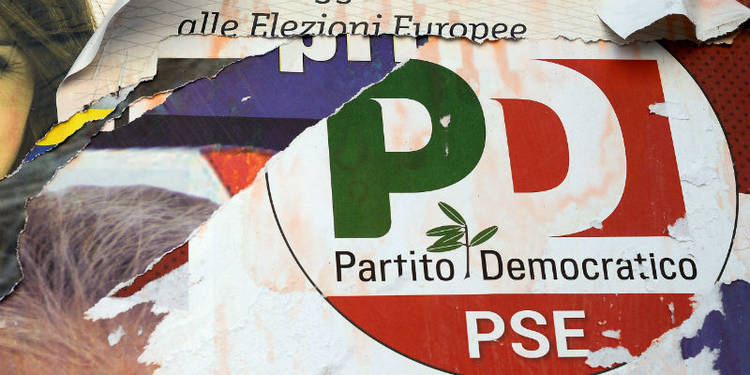


Thanks to recalcitrant old leaders, the ruling Partito Democratico (PD), until only recently Italy's largest single party with about 40% of the electorate, has split into two. The leaders most responsible for creation of the new splinter party are two old-style leftists, Pier Luigi Bersani [2]and Massimo D'Alema [3], who served as Italian premier from 1998 - 2000. As a result, the PD finds itself on the verge, if not of a nervous breakdown, of a new party congress expected to express new party leaders. Congress candidates to succeed former party leader (and former Premier) Matteo Renzi include Renzi himself, as well as Orlando and Emiliano.
No one can take lightly the splintering of the center-left party that has dominated Italian politics for the past three years under Renzi, whose government was expected to bring youthful energy and reforms to a nation in severe economic decline. With the weakened PD, Beppe Grillo, [4] head of the feisty Movimento Cinque Stelle (M5S), finds his party in pole position for a future government role. Before the split had come warnings of this, which went ignored. As one commentator noted, "Grillo is certainly the only one who can smile in a situation like this."
Grillo, however, comes with his own problems. He remains under attack from some of his warriors, who accuse him of being less than democratic in administering his party, which he likes to define as only a "movement". Secondly, the M5S [5]administration of the city of Rome --its most important and high visibility test under actual rather than rhetorical political terms -- has been less than successful under Mayor Virginia Raggi [6]. She has lost an impressive number of her closest political consultants to scandal and judiciary investigations.
The new party, born just this past week, has been baptized the Movimento dei Democratici e Progressisti (Democrats and Progressives Movement, MDP). Tallies of possible (but ever more difficult) future coalitions are already being made, based upon new polls. Results of the most recent, by Cartabianca for Rai3, indicated Feb. 28 that the M5S is the largest single party in Italy at 27%. The split slips support of the remaining PD down to 23% while the new Bersani-D'Alema left, or MDP, collects only 8%. Silvio Berlusconi, back again on the scene with Forza Italia, polls better, at 13%, but this is exactly the same result as for the Northern League (under Matteo Salvini, no longer particularly northern). None of the other five parties claims more than 5%.
Speaking on a TV talk show last week on his return from a visit to Calfornia, Renzi publicly blamed D'Alema for the split. "It was conceived, written and produced by Massimo D'Alema." They could not tolerate anyone but one of their own running the PD, he added, even though today's problems for the left are called Trump and Le Pen. "I'd actually been wanting to leave politics for a long time but my wife and children, after some hot debating, talked me out of it. My children have to kow that their father can lose, but will not surrender. OK, so I lost this game -- let's see what happens in the next."
Bersani defends the split by saying that it was Renzi "who did it all himself, the meltdown of the party [the PD]." There was nothing personal about it: "Renzi destroyed the PD, he emptied it of its democratic contents and weakened its ideals and political inspiration." For his part, D'Alema said that Renzi "must answer for how he governed the nation. I have trouble following Renzi -- I want to discuss serious problems. The party splinters do not interest citizens, the split had already taken place as millions of PD voters had already left the party, especially the leftist electorate. What we are doing is to put forward a constituency of the center-left that brings these forces back and gives them back pride in belonging to a real movement -- pride that was lost as the PD slid away from certain values."
To obtain its 8%, the splinter has acquired more splinters. It seems to have the backing of those who had already left two years ago to form, under Nichi Vendola, the respected Sinistra Ecologia Libertà party (SEL), but which was itself dissolved last December.
Renzi's election followed an historic election in February 2013, which showed the country split into three: the M5S and coalitions of the center-left and center-right. For the first year Enrico Letta governed, but was succeeded by Renzi in February 2014, heading Italy's 63d government in the 70 years since 1946. His successor, Premier Paolo Gentiloni, has to carry on, facing serious economic hurdles, including youth unemployment at 40%, lack of investments, and EU demands for Italy to reduce its gigantic public debt.
Gentiloni enjoys the backing of Italian President Sergio Mattarella, opposed to early national general elections before the legislature ends after five years in early 2018. On the plus side, inflation in Italy now stands at 1.5%, preferable to deflation, and despite pressures from many quarters (including Renzi), elections are postponed until at least this autumn. The question remains of which rules will govern the elections, however. At present there has been no reconciliation of the two different laws in force in the Chamber and the Senate.
Source URL: http://iitaly.org/magazine/focus/op-eds/article/center-left-party-splinter-weakens-italy
Links
[1] http://iitaly.org/files/centerleftpartysplinterweakensitalymassimodalemajpg
[2] https://en.wikipedia.org/wiki/Pier_Luigi_Bersani
[3] https://en.wikipedia.org/wiki/Massimo_D'Alema
[4] https://en.wikipedia.org/wiki/Beppe_Grillo
[5] https://en.wikipedia.org/wiki/Five_Star_Movement
[6] https://en.wikipedia.org/wiki/Virginia_Raggi